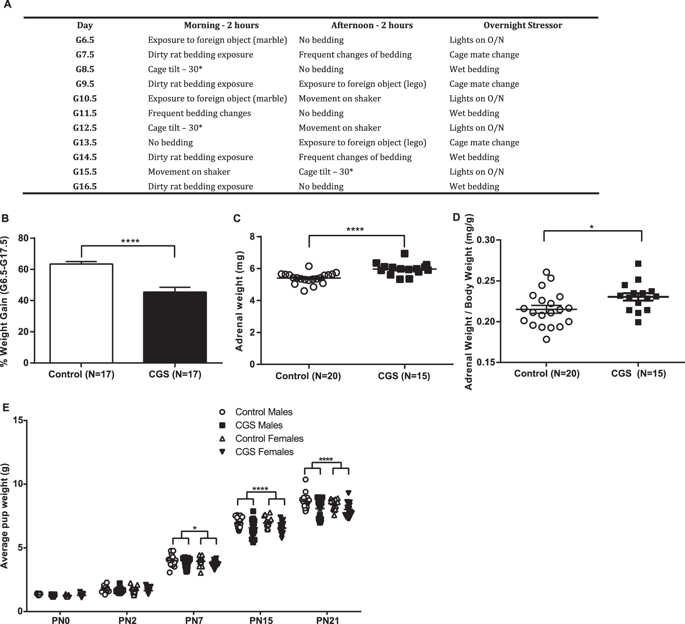当前位置:
X-MOL 学术
›
Transl. Psychiaty
›
论文详情
Our official English website, www.x-mol.net, welcomes your feedback! (Note: you will need to create a separate account there.)
Chronic psychosocial stress during pregnancy affects maternal behavior and neuroendocrine function and modulates hypothalamic CRH and nuclear steroid receptor expression.
Translational Psychiatry ( IF 6.8 ) Pub Date : 2020-01-16 , DOI: 10.1038/s41398-020-0704-2 Sandra P Zoubovsky 1, 2, 3 , Sarah Hoseus 1, 4 , Shivani Tumukuntala 1, 4 , Jay O Schulkin 5, 6 , Michael T Williams 2, 7 , Charles V Vorhees 2, 7 , Louis J Muglia 1, 2, 3, 4
Translational Psychiatry ( IF 6.8 ) Pub Date : 2020-01-16 , DOI: 10.1038/s41398-020-0704-2 Sandra P Zoubovsky 1, 2, 3 , Sarah Hoseus 1, 4 , Shivani Tumukuntala 1, 4 , Jay O Schulkin 5, 6 , Michael T Williams 2, 7 , Charles V Vorhees 2, 7 , Louis J Muglia 1, 2, 3, 4
Affiliation

|
Postpartum depression (PPD) affects up to 20% of mothers and has negative consequences for both mother and child. Although exposure to psychosocial stress during pregnancy and abnormalities in the hypothalamic pituitary adrenal (HPA) axis have been linked to PPD, molecular changes in the brain that contribute to this disease remain unknown. This study utilized a novel chronic psychosocial stress paradigm during pregnancy (CGS) to investigate the effects of psychosocial stress on maternal behavior, neuroendocrine function, and gene expression changes in molecular regulators of the HPA axis in the early postpartum period. Postpartum female mice exposed to CGS display abnormalities in maternal behavior, including fragmented and erratic maternal care patterns, and the emergence of depression and anxiety-like phenotypes. Dysregulation in postpartum HPA axis function, evidenced by blunted circadian peak and elevation of stress-induced corticosterone levels, was accompanied by increased CRH mRNA expression and a reduction in CRH receptor 1 in the paraventricular nucleus of the hypothalamus (PVN). We further observed decreased PVN expression of nuclear steroid hormone receptors associated with CRH transcription, suggesting these molecular changes could underlie abnormalities in postpartum HPA axis and behavior observed. Overall, our study demonstrates that psychosocial stress during pregnancy induces changes in neuroendocrine function and maternal behavior in the early postpartum period and introduces our CGS paradigm as a viable model that can be used to further dissect the molecular defects that lead to PPD.
中文翻译:

怀孕期间的慢性社会心理压力会影响母亲的行为和神经内分泌功能,并调节下丘脑 CRH 和核类固醇受体的表达。
产后抑郁症 (PPD) 影响高达 20% 的母亲,并对母亲和孩子产生负面影响。尽管怀孕期间暴露于社会心理压力和下丘脑垂体肾上腺(HPA)轴异常与产后抑郁症有关,但导致这种疾病的大脑分子变化仍然未知。本研究利用一种新型的妊娠期慢性心理社会压力范式(CGS)来研究心理社会压力对产后早期母亲行为、神经内分泌功能以及 HPA 轴分子调节因子基因表达变化的影响。接触 CGS 的产后雌性小鼠表现出母性行为异常,包括支离破碎和不稳定的母性护理模式,以及抑郁和焦虑样表型的出现。产后 HPA 轴功能失调,表现为昼夜节律峰值钝化和应激诱导的皮质酮水平升高,同时伴有下丘脑室旁核 (PVN) 中 CRH mRNA 表达增加和 CRH 受体 1 减少。我们进一步观察到与 CRH 转录相关的核类固醇激素受体的 PVN 表达降低,表明这些分子变化可能是产后 HPA 轴和观察到的行为异常的基础。总体而言,我们的研究表明,怀孕期间的社会心理压力会导致产后早期神经内分泌功能和母亲行为的变化,并引入我们的 CGS 范式作为可行的模型,可用于进一步剖析导致 PPD 的分子缺陷。
更新日期:2020-01-16
中文翻译:

怀孕期间的慢性社会心理压力会影响母亲的行为和神经内分泌功能,并调节下丘脑 CRH 和核类固醇受体的表达。
产后抑郁症 (PPD) 影响高达 20% 的母亲,并对母亲和孩子产生负面影响。尽管怀孕期间暴露于社会心理压力和下丘脑垂体肾上腺(HPA)轴异常与产后抑郁症有关,但导致这种疾病的大脑分子变化仍然未知。本研究利用一种新型的妊娠期慢性心理社会压力范式(CGS)来研究心理社会压力对产后早期母亲行为、神经内分泌功能以及 HPA 轴分子调节因子基因表达变化的影响。接触 CGS 的产后雌性小鼠表现出母性行为异常,包括支离破碎和不稳定的母性护理模式,以及抑郁和焦虑样表型的出现。产后 HPA 轴功能失调,表现为昼夜节律峰值钝化和应激诱导的皮质酮水平升高,同时伴有下丘脑室旁核 (PVN) 中 CRH mRNA 表达增加和 CRH 受体 1 减少。我们进一步观察到与 CRH 转录相关的核类固醇激素受体的 PVN 表达降低,表明这些分子变化可能是产后 HPA 轴和观察到的行为异常的基础。总体而言,我们的研究表明,怀孕期间的社会心理压力会导致产后早期神经内分泌功能和母亲行为的变化,并引入我们的 CGS 范式作为可行的模型,可用于进一步剖析导致 PPD 的分子缺陷。


























 京公网安备 11010802027423号
京公网安备 11010802027423号